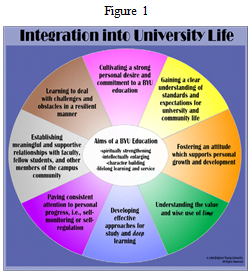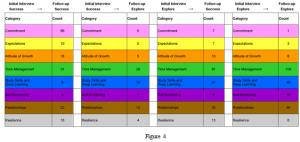Elizabeth Thackeray and Dr. Stefinee Pinnegar, Teacher Education
Background
Early intervention is often the key to freshman student success; however, it is often hard to uncover freshman students’ problems and difficulties until it is too late to help them adjust time schedules, develop stronger study habits, or create more balanced life-styles (DeBerard 66). The tool used in this program, the integration model (see fig. 1), shows promise for providing direction for early intervention efforts. This study explores whether this tool enables peer mentors to uncover student problems.

When students perform below the university’s predicted expectations, they are vulnerable to the challenges of the freshman experience (Kuh, et al 10-13). Early intervention is often the surest way to help students have a successful freshman experience. In addition to the change in academic demands on their time, they often face difficult problems in building a social life, creating good roommate relationships, connecting to faculty, and finding ways to become part of college life (Light 23-44). Unfortunately, students are often able to hide or ignore their difficulties in successfully resolving the problems they confront in these arenas. When the problems surface, it is often too late to help them change course or develop new skills.
Through the use of an outlier study, the NSSE and Learning Goals responses of students whose ACT scores would predict high success, but whose college GPA’s did not meet that prediction were compared with those whose ACT scores suggested they would struggle but whose college GPA was higher than expected. Through a careful analysis of the difference in the ways in which these students responded to the surveys, clear differences between the groups on a series of issues related to expectation and purpose were identified (Esplin, et al). The results of this study were presented to a group of peer mentors who work with these students. The peer mentors identified a set of key themes representative of the discriminating items. After using the themes to guide them in their exit interviews with freshman, the peer mentors changed the issues into discriminating questions (see fig. 2). The questions could be asked early in the freshman year allowing peer mentors to intervene, identify those who were struggling and support them in changing their behaviors in ways that would lead to more positive freshman experiences (Esplin, et al).

Purpose of this Project
After the development of the key questions, peer mentors began using the integration model with introductory interviews at the beginning of fall semester 2006 as a means to help students begin thinking about characteristics, skills, and attitudes that could tip them to perform better or worse than expected. In this introductory interview, students were asked to identify and discuss with their peer mentor one area in which they felt confident (an area they felt would help them succeed) and one area they felt less confident (an area they wanted to develop). Throughout the semester peer mentors attempted to support the students in strengthening their identified area. Then, during winter semester 2007 the peer mentors used the integration model again in their exit interviews with students and asked the students to reflect on their experiences during fall semester.
The purpose of this project was to explore the usefulness of the integration model for uncovering freshman transition difficulties.
This Study
After the peer mentors completed exit interviews with students during winter semester 2007, the peer mentors recorded the student narratives in relation to their discussion of the integration model and the students’ experiences during their first semester. From this point members of the Freshman Academy staff totaled the results for students who selected each category on the model of integration. (see fig. 3) and then broke the counts down to whether the student selected the category as an area in which they were confident or as an area they wanted to develop (see fig. 4).


Based on the counts, it was decided to focus this study on Time Management. An overwhelming number of students selected Time Management: 277 students overall selected this category during both the initial and follow-up interviews. And because 156 students selected Time Management as an area they wanted to develop at the beginning and then again at the end was puzzling. Why were so many students struggling with Time Management? With what in particular were they struggling? To answer these questions, I decided to look at the narratives of the students who selected this category to try and determine why so many students felt they were trying to develop their time management. After using Miles and Hubberman’s method for coding, I completed a story analysis on the time management narratives. As I read the narratives, it was apparent that although many students talk about time as being the main factor in their success or struggle at the university, the students’ narratives contained themes the more prominently related to other areas of the integration model. Time management relates to being able to use time in an effective manner; not putting off assignments until the last minute; using time effectively throughout the day, meaning not going home in between each class and using shorter breaks of time to study and complete assignments; and prioritizing. However, many students’ stories focused on themes that did have some tie to time management, but were more closely connected with another area on the Model of Integration. For example one student said the following: “I have lots of time to study, but I don’t feel like it’s as productive as it should be, because I just read and it doesn’t seem like it ‘goes in’.” This student selected time as an area she wanted to develop, yet her narrative clearly identifies Study Habits and Deep Learning as the area in which she needs to develop. This pattern of finding themes that pertained to other areas of the Integration Model continued through all of the students’ narratives.
Results
Now, what does this all mean? Well it means a lot of different things. It means that when students talk about time, they aren’t always talking about time. More research needs to be done to determine why students select time over the other areas on the model. It could be because Time Management, as a category, is more concrete than most of the other categories. It is something the students think about on a daily basis, whereas Understanding Expectations is much more abstract, and although extremely important, it is harder for students to conceptualize, and therefore they do not select this category as frequently as Time Management or the other categories. The fact that students select Time Management also tells us that they may not understand the categories as well as they should; and that they certainly do not understand how holistic the categories are: how each category influences the others. This means that not only do peer mentors need to make sure the students understand the categories, mentors also need to probe students to tell them more about the areas they self-select. Then when students talk about time, if they aren’t really talking about time, the peer mentor needs to point out the connections to the other areas of the Integration Model, to help the students understand how the areas are all connected.
Presentation
Presented in Poster Sessions at the 27th Annual Conference on the First-Year Experience, San Francisco, California, 2008-02-18 and at the International Consortium for Educational Development Conference, Salt Lake City, Utah, 2008-06-13.
Works Cited
- DeBerard, M.S., Glen I. Spielmans, and Deana L. Julka. “Predictors of academic achievement
and retention among college freshman: A longitudinal study.” College Student Journal 38.1(2004): 66-80. - Esplin, Patricia, Elizabeth Thackeray, Breanne Didenhover, and Bryce Bunting. Poster: “Key
Questions for Guiding Students to Success” presented at the Annual Conference on the First-Year Experience, Addison, Texas, 2007-02-19. - Kuh, George D., et al. Student Success in College: Creating Conditions that Matter.
Washington, D.C.: Jossey-Bass, 2005. - Light, Richard J. Making the Most of College: Students Speak Their Minds. Cambridge, MA:
Harvard UP, 2001. - Miles, Matthew B. and A. Michael Huberman. Qualitative Data Analysis. Thousand Oaks, CA:
SAGE Publications, 1994. - Thackeray, Elizabeth. Poster: “A Model Approach to Early Intervention and Integration Into
University Life” presented at the 27th Annual Conference on the First-Year Experience, San Francisco, California, 2008-02-18 and at the International Consortium for Educational Development Conference, Salt Lake City, Utah, 2008-06-13.
